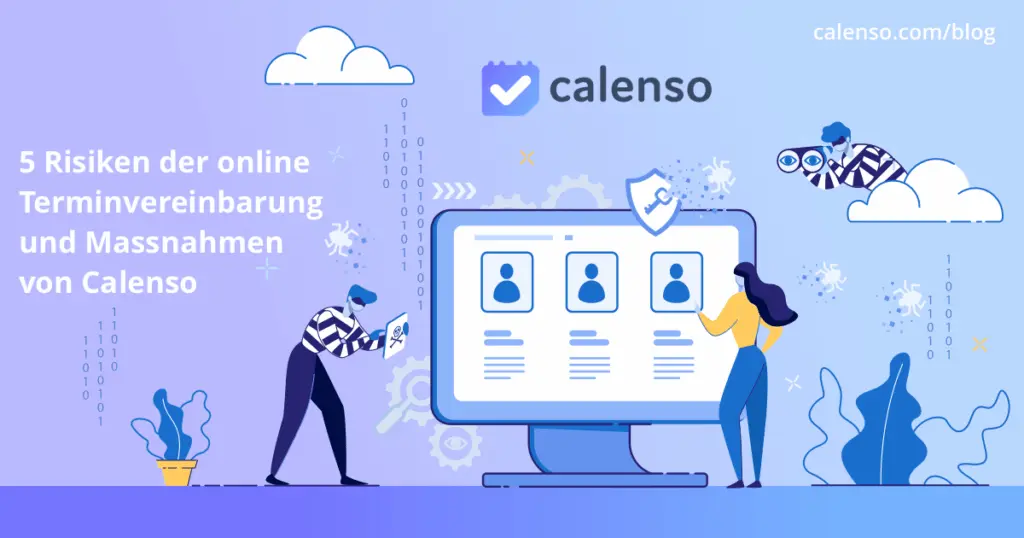Making appointments online can give rise to concerns about data security and other topics. Fears usually arise in connection with software or the setup in everyday processes, which should be taken seriously. That's why we present the most important risks associated with online appointment scheduling and show you what Calenso is doing about them. This way, you are protected from most risks and can take online appointments with peace of mind.
Risk 1: Data protection and data security
Data protection is always a major topic when it comes to the security and protection of customer data. Software collects personal data for the use and personalization of the software. This is usually necessary for the functions. This is problematic if the data is transmitted unencrypted (without HTTPS). In addition, surfing behavior is often examined and stored. This data is then used by Google AdSense to create personalized advertisements.
Calenso only uses the most necessary data of your customers. You decide which data you want to collect when you make an appointment. Please take a look at the article "What do I have to consider during the customer's booking?". We use this data to generate a customer database or an appointment overview. They are necessary for using the software. In addition, your customer can decide to create a customer account on Calenso. Calenso only uses encrypted forms and does not track the usage behavior of your customers.
It is well known that no software is so secure that it is completely protected against hacker attacks. Smaller providers usually lack the money to have their software professionally analyzed or certified. As a result, vulnerabilities are often not identified. As a result, customers' login information may be taken over by third parties and sold on the black market.
Calenso encrypts all data during transmission. This protects the data from being viewed by third parties.
2: Availability and outages of the provider
Most providers of online appointment scheduling host their applications with a web host such as Cyon or Hostpoint. These are two of the largest web hosting providers on the Swiss market. In most cases, an availability of 99% to 99.9% is guaranteed. Almost no web hosting provider guarantees 100% availability, as the costs would otherwise rise immeasurably. This is why server failures occasionally occur. As a result, customers are no longer able to connect to the appointment management software. Cyon provides an example of this: at the beginning of 2013, there was an outage lasting almost 18 hours before the problem could be resolved. The risk of failure can be further reduced by using external calendar providers such as Microsoft Exchange, Google Calendar or iCloud. This means that the appointments are stored in the data centers on the servers of the major providers.
Calenso is hosted in Switzerland by NINE in a managed cloud infrastructure. NINE is a reliable provider that meets the highest security standards. The ISO270001 information security and ISO9001 quality assurance certifications provide additional guarantees. As a result, Calenso has not (yet) experienced any major outages.
3: Strategic dependency and loss of control
As soon as you have decided on an online appointment booking provider, you enter into a certain strategic dependency. Depending on the provider, there may be a "lock-in effect", which can only be avoided at great expense. A lock-in means that switching to another provider is expensive or impossible and all data would be lost. Many users also fear a loss of control over the flexibility of appointment allocation and workload.
With Calenso you take no risk or lock-in. There are two reasons for this. Firstly, you can try out Calenso with all its functions for a certain test phase. This allows you to see whether the loss of control is too great for you. Secondly, you can simply download all your data (whether customer data, appointment lists, services, etc.) if you want to switch to another provider.
4: Abuse by competitors and customers
In principle, anyone can book an appointment using an online appointment booking tool. In the absence of security functions, disgruntled customers or competitors can book all possible appointments with a provider and thus fill the provider's capacity with appointment requests. Even the frequently used solution of 2-factor authentication can only provide a limited remedy here.
Calenso offers you the option of deactivating the shopping cart function. This means that customers can only book one service per transaction. There is also a second function. As soon as this is deactivated, it is only possible to make an appointment for one booking. Tip: If you really have the problem mentioned above, then only send the booking link to selected customers.
You can find more information about security in our support portal. We have also put together an article to help you use online appointments correctly from a legal perspective.





















